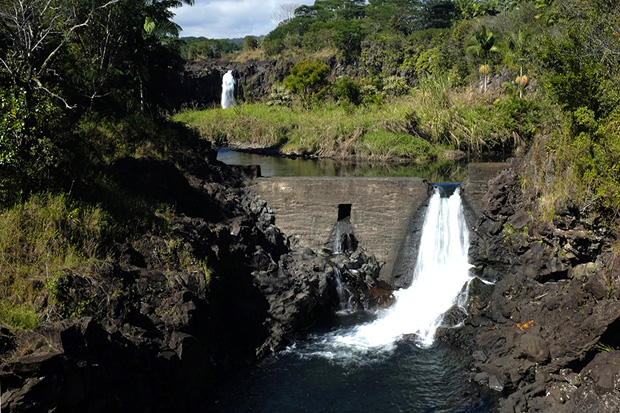
Increasing population, changing land use practices and issues relating to climate change are contributing to growing concerns over water quality and quantity in Hawaiʻi. To help the state address this critical issue, the National Science Foundation has awarded $20 million to the University of Hawaiʻi to do a five-year, groundbreaking study of water sustainability issues through a collaboration called ʻIke Wai.
The project name ʻIke Wai symbolizes knowledge (ʻike) of water (wai) which informs values, policies and practices for managing this resource. The ʻIke Wai program assembles UH, state and federal agencies and community partners to address critical gaps in the understanding of Hawaiʻi’s water supply that limit decision making, planning and crisis responses. The project spans geophysics, microbiology, cyberinfrastructure, data modeling, indigenous knowledge and economic forecasting and pairs university scientists in partnerships with state and federal agencies and community groups.
“ʻIke Wai will impact every citizen and business in the state, as it gives Hawaiʻi policy makers the ability to make data-driven, community informed decisions about the future of water in Hawaiʻi,” said Gwen Jacobs, UH cyberinfrastructure director and the project’s principle investigator. “This exciting partnership will link cutting edge research directly to community needs to secure a sustainable water future for Hawaiʻi and its neighbors in the Pacific.”

Preserving Hawaiʻi’s water resources
The overall goal of ʻIke Wai is that new data on groundwater flow, sustainable yield and economic impact will help communities and state decision makers preserve Hawaiʻi’s water resources for the future. ʻIke Wai also incorporates important educational and cultural goals. New degree programs at the University of Hawaiʻi at Hilo and new training programs at the University of Hawaiʻi at Mānoa will produce a new generation of big data scientists and data analytics professionals in Hawaiʻi. A collaboration with UH Mānoa’s Hawaiʻinuiākea School of Hawaiian Knowledge will imbue the ʻIke Wai project with traditional understandings and values based in Hawaiian water management practices.
“This is a compelling example of how the University of Hawaiʻi is helping Hawaiʻi and the world through our unique strengths and partnerships,” said UH President David Lassner. “It also exemplifies how we synthesize cutting edge research, education and traditional Hawaiian knowledge to address critical community issues, including through the utilization of modern cyberinfrastructure and data science.”
“Our ancestors had a sophisticated understanding of water sustainability practices,” said Gregory Chun, ʻIke Wai team leader and Hawaiʻinuiākea faculty member. “ʻIke Wai will inform the state’s water policy and practices with new data and models and through the integration of traditional knowledge and values concerning this most precious of resources.”
The ʻIke Wai partnership
ʻIke Wai is a collaboration between the University of Hawaiʻi, Hawaiʻi State Departments of Health and Land and Natural Resources, Honolulu Board of Water Supply, Hawaiʻi County Department of Water Supply, U.S. Geological Survey and community partners to create a data driven, sustainable water future for the state of Hawaiʻi and its Pacific neighbors. For more information go to the EPSCoR website.

